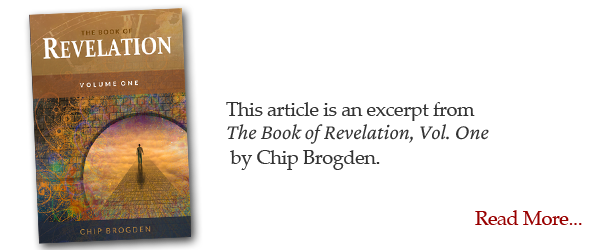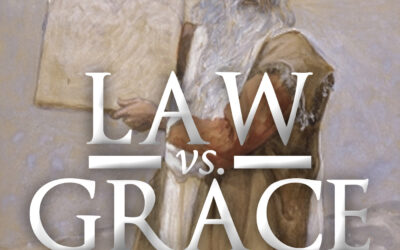(1) To Reveal Christ as Preeminent Over All Things
First and foremost – and again this brings us back to the focus of our study – is to consider the Book of Revelation from a Christ-centered perspective, from the perspective of a Christ-centered faith. We’ve already demonstrated how the Testimony of Jesus, or “the truth concerning Jesus” is the spirit of all prophecy, it says in Revelation 19:10. The truth or the Testimony of Jesus is the spirit of all prophecy. In other words: it’s the purpose; it’s the reason; it’s why God declares things prophetically, and through prophetic people, and through visions, and dreams, and words. It’s not so much to give us insight into all these different things, but it is to reveal Christ. It’s the truth concerning Jesus. In Revelation 1:1 it identifies the Book as the Revelation of Jesus Christ to reveal Christ, to show Christ as preeminent over all things.
Whether you see it as a Spiritual Book, whether you see it as a Historical Book, whether you see it as events pertaining to the future or a Hybrid approach – whatever the approach, the main purpose is to reveal the preeminence of Christ in all things. He is revealed as the Alpha and the Omega, as the Beginning and the End, the One Who is, Who was, and Who is to come. That covers past, present, and future. It is to reveal Christ and to reveal His preeminence, His Lordship, His Kingship, over all things. That’s the primary purpose of the Book. Regardless of the interpretation or the approach, if we keep that in mind, then we will understand the meaning and purpose much better. And we won’t get lost as much in the nuance and in the controversy and conflict of what individual details mean, because we’re not going to come to a complete understanding and a complete agreement on those details. But we can come to a consensus on the seven purposes or the sevenfold purpose, the first being to reveal Christ as being pre-eminent over all things.
(2) To Show Things That Would Shortly Take Place
The second purpose of the Book is to show things that would shortly (or quickly) take place. The Preterist will focus on “shortly” and say, “See! This is referring to things that have already happened because it says that the purpose of the Book is to reveal things that must shortly take place!” But then somebody else will look that word up and say, “Well, it can also mean quickly take place or suddenly take place – it doesn’t necessarily mean it’s going to happen soon but it means it’s going to happen quickly and suddenly!” Once again God hides this by design.
But we do see the purpose, Revelation 1:2,3:
…who bore witness to the word of God, and to the testimony of Jesus Christ, to all things that he saw. Blessed is he who reads and those who hear the words of this prophecy and keep those things which are written in it; for the time is near. (Rev. 1:2,3)
Elsewhere it says, the time is at hand or the time is close.[1] Regardless of whether it means it’s going to happen really soon or whether it’s intended to mean it’s going to happen suddenly and quickly when it does happen, however long in the future it happens, the second purpose of the Book is to reveal or to show things that would take place. Obviously there is an element of the future in the Book. We cannot escape that.
(3) To Encourage the Faithful
The third theme here, and the third reason the Book was written, was to encourage the faithful. To encourage those believers in Jesus to keep believing, to stay faithful, to be obedient. It says:
Blessed is he who reads and those who hear the words of this prophecy and keep those things which are written in it. (Rev. 1:3)
As we get into the chapter-by-chapter study and we begin considering the state of the Seven Ekklesias of Asia (Revelation 2 and 3), and as we look at the Overcomers, we’re going to see this theme coming very frequently: That the reason this Book was written was to encourage people who were going through persecution, people who are suffering for their faith. It’s to encourage them not to give up and to remain faithful. That’s a recurring theme, especially in the seven letters to the Seven Ekklesias. It’s also the fourth reason for the Book of Revelation…
(4) To Warn the Unfaithful
There’s a message here for the committed believer to remain committed and to remain faithful. But there’s also warnings to those who are unfaithful – believers (or people who claim to be believers) but for whatever reason they are drifting away. They have lost their First Love [in Ephesus], or they have a reputation for being alive but they are dead [in Sardis], or they have compromised their testimony for one reason or another [in Thyatira], or they are simply lukewarm, neither hot nor cold [in Laodicea]. It’s a warning – and yes, it’s a warning to the lost – but first and foremost…
Never, ever, ever forget… This is one of the issues that I have with a lot of Bible teachers. They automatically assume that all the blessings and rewards in the Book of Revelation go to believers, to Christians, to people who go to church, to people in God, to people who believe the Bible; and all of the punishment, all of the wrath is being poured out on those dirty, old, nasty, wicked, evil people who don’t believe in Jesus, who don’t go to church – and so this Book of Revelation is all about punishing everyone who’s not a Christian. But I want you to remember – and never forget – that the context of this letter was written to people who were already believers in Jesus. Some were faithful and some were unfaithful. Some were committed and some were uncommitted. Some were on fire and some were lukewarm. And the main thrust of the Book reinforces what Peter had already warned them: that “judgment must begin in the house of the Lord.”[2]
You know people will just kind of breeze through the Seven Letters because they want to get to the Trumpets and the Seals and the Bowls and the mark of the beast and all the bad things that are going to happen to the world. But we need to pay very, very close attention to these warnings being made – not made to the world but made to those who claim to be believers in Jesus and yet they are in danger.
This is a warning to the institutional church. It is a warning to those who have a religion about Jesus, but they don’t have a relationship with Jesus. There is a difference – and the Book of Revelation makes that very, very plain. Unfortunately, most Bible teachers do not make it plain. As a result, they lightly pass over the things that we’re going to dig into, in their haste to get to the judgment on the world, and the great white throne judgment, and the lake of fire, and yeah, yeah! But you’re going to be (I think) surprised when we actually dig into this and find out where this judgment is coming from.
Now, I’m not saying that the world won’t be judged. Of course it will. I’m saying judgment begins in the house of God; and that’s why the Book of Revelation starts out with Jesus in the midst of the candlesticks (or lampstands is a better translation). Jesus in the midst of His own people: encouraging the faithful to keep being faithful, and warning the unfaithful, warning the lukewarm, that they need to repent, get back to where they were to begin with, or they’re in trouble. These are things many people want to lightly pass over. We’re not going to lightly pass over them, because I think that sets the stage for everything else that happens – and I think it really impacts the interpretation as well.
But if you come to the Book of Revelation with a preconceived idea that all the blessings are for all the believers in Jesus, and all the punishment is for those who don’t believe in Jesus, you’re oversimplifying the purpose of this Book. The Book of Revelation confirms exactly what Jesus said: “In that day many will come to Me and say, ‘Lord, Lord we prophesied in Your Name, and in Your Name we did all of these marvelous things,’ and He says, ‘I don’t know you. Depart from Me.’ And there will be weeping and gnashing of teeth.”[3] The world is not coming to Jesus justifying entrance into the Kingdom of God based on all the wonderful things they have done in His Name because they’re not doing anything in His Name! The only people who would justify entrance into the Kingdom of God based on all the wonderful things they have done “in the Name of Jesus” are religious people.
There is this clash here between religion and relationship that plays itself out in the Book of Revelation; and if you are on the wrong side you’re going to be in trouble. Yet Bible teachers? They just gloss right over it, automatically assuming everyone who believes in Jesus is going to be rescued in the “rapture.”
Well, we assume nothing. We take everything exactly the way it comes across in Scripture – and I think even with those words of introduction, you will see that there is some gravity here. There is some seriousness here as we get into these letters to the Seven Ekklesias. Just as much as prophecy teachers want to focus on Seven Seals, Seven Trumpets, Seven Bowls, there are Seven Letters that come before all those other things, and these letters are judgments just as much as the other – but these letters are judgments on God’s people.
But you haven’t looked at it. You probably haven’t heard many people focus on that aspect of the Book of Revelation. It will be good, and it will encourage you to remain faithful. If you’re not where you need to be, it will hopefully wake you up so that you can repent from where you have fallen and “do the first works again, or else…”[4] Or else! And you see, that’s a very threatening thing. Listen! We live in a day, we live in a time, where everyone just wants to do whatever it is they do, and everything is fine, and God loves you no matter what – and Scripture does not bear that out. As if Jesus is too loving and kind to threaten anybody! Well, we’ve got the wrong idea, don’t we?
Okay, so let’s move on from that. Continue on with the fifth purpose of the Book of Revelation…
(5) To Show the Ultimate Judgment and Defeat of Evil
It’s to show the ultimate judgment and defeat of evil. Now, we can disagree on how that actually plays out. Is it spiritual? Is it symbolic? Is it in the future? Is it in the past? Is it a spiritual principle that keeps recurring over and over again in the cycle of history? But the bottom line is the Book does show the ultimate judgment and defeat of evil – that evil is self-defeating; evil is a black hole that collapses in upon itself. And so evil and everything connected to evil is heading for a judgment. Now in the meantime it looks like evil becomes stronger and stronger. It’s pervasive, and it seems like the darkness is greater than the light. But the purpose of the Book of Revelation is to show that no matter how dark things get, no matter how bad things seem, no matter how powerful evil appears to be, that Jesus is Lord and ultimately evil will be defeated.
By the same token, the sixth purpose is…
(6) To Show the Ultimate Reward and Triumph of Good
And by “good,” I don’t mean good in the sense of good works trying to balance out your bad works, but I’m saying the goodness of God. It says where sin abounds His grace does much more abound.[5] Much more abound! Grace is greater than sin! In the Book of Revelation we have the ultimate expression of evil. You have the ultimate expression of darkness. You have the ultimate expression of everything that is antichrist and anti-good. And yet, even though mankind rebels, and even though the devil puts everything he can into an effort to destroy mankind, you see the ultimate reward and triumph of good over evil. You see that God’s purpose is fulfilled and that’s the seventh thing…
(7) To Show the Kingdom, Mystery, and Purpose of God Being Fulfilled in Christ “on earth as it is in heaven.”
God’s purpose is fulfilled – in spite of all the evil, all the wickedness, all the sin, all the death, all the destruction. We see that, in the end, the Book of Revelation shows us the Kingdom, the mystery and the purpose of God being fulfilled in Christ “on earth as it is in heaven.” Just like He had us pray: “Our Father in heaven, may Your Name be hallowed and reverenced. Your Kingdom come. Your Will be done, on earth as it is in heaven.” And we find in the Book of Revelation that heaven is not permanent, but heaven comes down to earth! We also find that hell is not permanent, but hell is consumed in the lake of fire! A lot of the assumptions that people have had don’t necessarily stand up under the scrutiny of Scripture. Because the purpose is really not to take you to heaven and live with Jesus forever; the purpose is for God and Christ to fill all things on earth. For His Will to be done on earth. For His presence to be on earth. His Kingdom to be on earth as it is in heaven. Heaven and earth will pass away in order to make room for a new heaven and a new earth where righteousness dwells.[6]
[1] Rev. 1:3; 22:10.
[2] 1 Pet. 4:17.
[3] cf. Mt. 7:22,23 et al.
[4] Rev. 2:5.
[5] Rom. 5:20.
[6] 2 Pet. 3:13.













